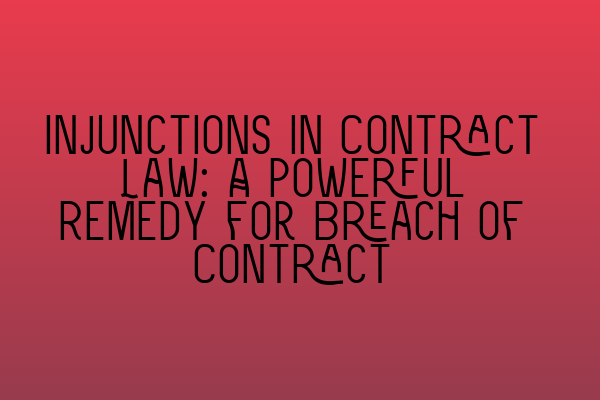Injunctions in Contract Law: A Powerful Remedy for Breach of Contract
Contracts are the foundation of business relationships. They establish rights and obligations between parties, ensuring that each party fulfills their end of the bargain. However, there are times when one party fails to perform their contractual obligations, resulting in a breach of contract. In such cases, seeking legal remedies becomes necessary to protect your interests.
When it comes to breach of contract, one of the most powerful remedies available is an injunction. An injunction is a court order that compels or prohibits a party from performing specific actions. It aims to prevent or rectify harm that may arise from the breach and ensure the aggrieved party receives appropriate relief.
The Nature of Injunctions
Injunctions can be either prohibitory or mandatory. A prohibitory injunction restrains a party from taking certain actions, while a mandatory injunction requires a party to carry out specific actions. In both cases, the court evaluates the circumstances and determines the appropriate type of injunction based on the facts and legal principles involved.
Injunctions are discretionary remedies, granted at the court’s discretion. Therefore, the applicant must satisfy the court that an injunction is necessary and appropriate under the circumstances. Courts consider various factors, such as the likelihood of success on the merits, the adequacy of damages as a remedy, and the balance of convenience between the parties.
The Effectiveness of Injunctions in Breach of Contract Cases
Injunctions are particularly effective in breach of contract cases when damages alone may not adequately compensate the aggrieved party. While monetary damages can provide financial compensation for losses suffered, they often fail to address the non-monetary harms caused by the breach.
For example, consider a scenario where a designer contracted to create a unique logo for a company fails to deliver the promised design. In such a case, the company may suffer reputational damage, lost business opportunities, and time wasted. Monetary damages alone may not fully restore the company’s reputation or recover the lost opportunities. An injunction, on the other hand, would force the designer to complete the logo or prevent them from using their work elsewhere, ensuring the company receives the unique logo it contracted for.
Moreover, injunctions can help mitigate ongoing harm caused by a breach. In some cases, the consequences of a breach may continue to escalate, causing irreparable harm that cannot be easily compensated by monetary damages. For instance, if a contractor breaches a construction contract by using substandard materials, allowing the project to continue could result in shoddy workmanship, potential safety hazards, and extensive rework costs. In such situations, an injunction can halt the contractor’s actions and prevent further harm, protecting the interests of the party suffering the breach.
Applying for an Injunction
Applying for an injunction requires careful consideration and expert legal advice. The applicant must provide compelling evidence to satisfy the court of the need for an injunction. They must demonstrate the likelihood of success on the merits, the adequacy of damages as a remedy, and the potential harm that may arise in the absence of an injunction.
Working with an experienced contract law solicitor is crucial when seeking an injunction. They can guide you through the legal process, help you gather the necessary evidence, and present a strong case to the court. Additionally, having a solicitor who understands search engine optimization (SEO) can enhance your chances of finding the right legal expertise online.
Speaking of SEO, if you want to prepare for the SQE exams or find SQE preparation courses, check out our related articles:
- SQE 1 Practice Exam Questions
- SQE 1 Practice Mocks FLK1 FLK2
- SQE 2 Preparation Courses
- SQE 1 Preparation Courses
- SRA SQE Exam Dates
By following the links above, you can access valuable resources to aid your SQE exam preparations and find courses tailored to your needs. Whether you are looking for practice exam questions or seeking guidance on the SQE exam dates, these articles are your go-to source for all things SQE-related.
In conclusion, injunctions are a powerful and effective remedy for breach of contract cases. They provide a means to prevent ongoing harm, rectify non-monetary losses, and protect the interests of the aggrieved party. However, obtaining an injunction requires expert legal advice and evidence to convince the court of the necessity for such relief. If you find yourself facing a breach of contract situation, consult with a contract law solicitor who can guide you through the process and ensure your rights are protected.
